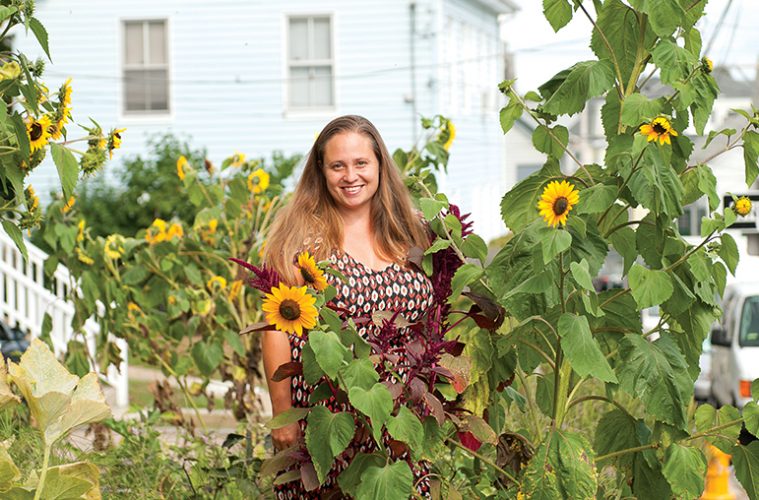The house at 9 Beacon Street in Gloucester clearly belongs to creative types, with its jumble of raised planter beds out front and offbeat belongings inside. Home to Lara Lepionka’s family, it has also served as headquarters to Backyard Growers for the past five years. As of January 1, however, it reverted back to a private residence. Today, 269 Main Street houses all of the activity spawned by the program’s executive director.
Lepionka started growing some of her own food as a way to save money during the 2008 recession. Before long her husband and two daughters had trowels in hand, too. “It just kind of took off and became this family project,” she says. So successful were her efforts that she decided to reach out to her neighbors with the idea. And in 2010, she launched a pilot program that would spread the word even further. She worked with seven families in the Beacon Street neighborhood and at the Riverdale Youth Community Garden in Riverdale Park. “Our goal was to help people have that visceral experience of growing their own food.”
The program participants were amazed at the yields that came out of their home gardens. They also reported monetary savings and an increase in vegetable consumption. Not only did the backyard gardens meet some of the families’ food needs, they also improved environmental conditions in the city’s downtown neighborhoods and fostered unity among diverse populations.
From the beginning, Backyard Growers has partnered with community-focused nonprofits like The Food Project, The Open Door,and the Cape Ann Farmers’ Market. “We get so many different kinds of support from different organizations,” notes Lepionka, whose program has grown exponentially each year since its inception—it is now responsible for over 150 raised gardens in the city of Gloucester. “Our role is really around community organizing and training people—all those soft skills of connecting with people and getting them excited about growing their own food.”
Initially, she was attempting to reach people who were new to gardening or who had lifestyles that required growing food be easy and close at hand; she wanted to help them do it in such a way that it became part of their home life. “We feel very strongly about providing people with proper training so they can be successful,” says Lepionka. “It’s one thing to build gardens; it’s another to change people’s attitudes toward food.”
-1024x590.jpg) |
Her latest undertaking takes the program further still—from private homes into public schools. A mother with children in the Gloucester school system, Lepionka noted the lack of a cohesive model for school– based gardening. So she took it upon herself to implement one, beginning with West Parish, where her daughter is a student. The idea was to make it very doable. She started with basic fall crops. “It’s about doing this really simple thing that has a major impact.”
Today, 100 percent of the district’s schoolchildren plant a salad crop in April. (Its growing cycle ends before the school year is over, so the kids can harvest it and eat it in their cafeteria.) And before they leave for summer break, each grade plants a fall crop. As a result of these two programs—Salad Days and Fall Harvest Days—over 1,300 children visit a garden three times a year and have the experience of planting a seed, tending to it, watching it grow, harvesting it, prepping it, and eating it. “[We] help keep kids healthy and connect them to real food,” says Meghan Stratton, a FoodCorps service member and part of Backyard Growers’ growing staff.
Those signature programs “are like broad sweeping gestures,” says Lepionka. But she and Stratton are also now working with smaller groups in after-school programs and incorporating in-class experiences that get into science-related topics and ideas around food systems. “It’s been great to be able to do both of those pieces,” says Lepionka.
At this point, thanks to Backyard Growers, many children have gar- dens both at home and at school. The entire sixth grade at O’Maley Innovation School has planted a variety of cover crops, which were the subject of lessons on soil science last fall. They will also soon plant popcorn-variety corn and have a unit around it that touches on history, science, and math. “You can take corn and hit every academic area with it,” says Lepionka. “It’s really rich.” They also do an in-class program in the winter at Beeman school that focuses on the science of growing. Discussions about the interconnectedness of the food web are part of the program. “We are always thinking about ways to provide children with notions of systems—of how one thing leads to the next thing,” says Lepionka.
Getting kids tasting and trying new vegetables is the goal. Toward that end, Backyard Growers partners with the Food Service Department and the schools’ kitchen staff, who help prepare and serve special tastings for the students. If they try the food, they get an “I Tried It” sticker. They also have stickers for the kids to use to demonstrate whether or not they liked what they tried. In this way, they learn if kids are trying things and what they think about it. “It’s so effective,” notes Stratton. “If you put it to them with a little bit of fanfare, then they all love it.”
Long-term plans include growing the staff to have more support for direct services. They would also like to start urban gardening in partnership with the city “to really deepen and strengthen this work in the community so it becomes a change in culture around food production,” explains Lepionka. Though physically based in Gloucester, they have created replicable models that they share with people outside the city— the Schoolyard Garden Program being the prime example.
“We always refer to ourselves as scrappy because we are interested in creating systems that are efficient, lean, and effective,” says Lepionka, who is known to be very savvy with resources. “We take them and churn them into high-impact programs with huge numbers of people served.” backyardgrowers.org

